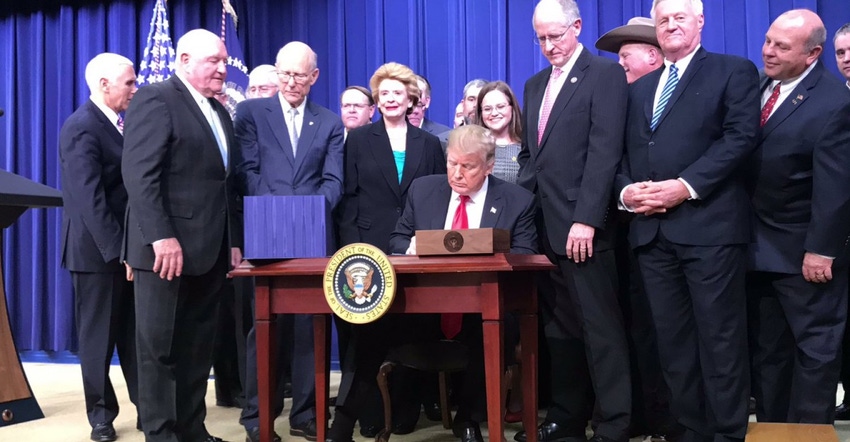
When speaking at the American Farm Bureau Federation meeting in January, President Trump promised an on-time farm bill. Although it is nearly three months after the Sept. 30 expiration, Trump was able to deliver a farm bill without an extension for farmers as they deal with continued constrained economic times.
In signing the bill in a ceremony Thursday, Trump called the bill a “tremendous victory” for the American farmer and said the bill protects crop insurance programs, offers funds to producers who rely on government support in times of disasters, doubles money provided for loans to farmers and expands broadband assistance. Trump also touted the newly-announced rule proposed to require work requirements in order to receive nutrition assistance as a way to “transition from welfare to willful employment.”
Secretary of Agriculture Sonny Perdue said President’s Trumps signature on this bill is a Christmas present to American agriculture. “Farmers take financial risks every year as a matter of doing business, so having a farm bill in place gives them peace of mind to make their decisions for the future.”
Trump was joined by many rural members of Congress, as well as key representatives from different agricultural groups including the National Wheat Growers Association, National Pork Producers Council and National Milk Producers Federation.
A show of the strong bipartisan support, something that even President Trump acknowledged has been hard to accomplish in Washington these days, was the accomplishment of getting the bill across the finish line in the year it was introduced. House Agriculture Committee chairman Mike Conaway, R-Texas, said, “Because of the support of the president, Sec. Perdue and a Republican Congress, we were able to deliver a new farm bill in the same year that the legislation was first introduced, which marks a first in nearly 30 years. I’m proud of this bill and I’m honored to have served as chairman throughout this process.”
“Since early talks on this farm bill began back in 2017, I’ve always believed it would be more evolutionary, rather than revolutionary, and that has borne out to be true,” Perdue said.
Senate Agriculture Committee Chairman Pat Roberts, R-Kan., said the final bill crafted addresses the concerns of all regions and all crops. “In a tough economy, the evolutionary, not revolutionary approach of our bill received the most votes of any farm bill in history,” Roberts said.
The House approved the measure by a vote of 369-47 and in the Senate by a vote of 87-13.
That evolutionary, rather than revolutionary, approach to this year’s farm bill should make it easier for farmers to transition to the updated farm bill.
Without a lot of new money, Congress wasn’t able to reinvent the wheel. Joe Outlaw, regents fellow, professor and extension economist at Texas A&M, said the new farm bill makes some tweaks, especially in the commodity title, which should help the safety net function better for producers.
Many agricultural groups offered their praise for the farm bill after its signing on Thursday. Zippy Duvall, president of the American Farm Bureau Federation, who was on hand at the signing said this farm bill offers needed assistance to the farming community.
“The Agriculture Improvement Act—H.R. 2—is now law. Enactment means risk management tools, foreign market development and environmental stewardship programs continue to be available, and on terms that reflect a much tougher farm economy than the one we faced when the last farm bill became law,” Duvall said.
Specifically the Farm Bureau also identified that the farm bill brings another five years of certainty to farm and ranch families; upholds fiscal responsibility of being budget neutral; improved risk management programs; protects crop insurance; funds much-needed trade development; invests in future with funding for ag research and beginning farmer programs; and continues nutrition assistance (three-quarters of total farm bill funding) for lower-income Americans.
USDA now turns to implementation, and Perdue promised those on hand at the signing ceremony that he would do his best to implement it as best as Congress intended.
“All told, this is a farm bill that should be welcomed by producers, and at USDA we will eagerly implement its provisions,” Perdue said in a statement following the signing.
House Agriculture Committee ranking member Collin Peterson, D-Minn., is likely to assume the committee chairmanship as the new Congress starts in 2019. He previously said he plans to take a more active role in ensuring the USDA implements the farm bill as its written, similar to what he did when he held the role of chairman after the 2008 Farm Bill.
“I look forward to working with USDA in the coming Congress to ensure these programs are implemented as quickly as possible and to their full effectiveness,” Peterson said.
About the Author(s)
You May Also Like




